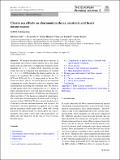Charm sea effects on charmonium decay constants and heavy meson masses
Author(s)
Calì, Salvatore; Eckert, Kevin; Heitger, Jochen; Knechtli, Francesco; Korzec, Tomasz
Download10052_2021_Article_9520.pdf (820.6Kb)
Publisher with Creative Commons License
Publisher with Creative Commons License
Creative Commons Attribution
Terms of use
Metadata
Show full item recordAbstract
We estimate the effects on the decay constants of charmonium and on heavy meson masses due to the charm quark in the sea. Our goal is to understand whether for these quantities Nf=2+1 lattice QCD simulations provide results that can be compared with experiments or whether Nf=2+1+1 QCD including the charm quark in the sea needs to be simulated. We consider two theories, Nf=0 QCD and QCD with Nf=2 charm quarks in the sea. The charm sea effects (due to two charm quarks) are estimated comparing the results obtained in these two theories, after matching them and taking the continuum limit. The absence of light quarks allows us to simulate the Nf=2 theory at lattice spacings down to 0.023 fm that are crucial for reliable continuum extrapolations. We find that sea charm quark effects are below 1% for the decay constants of charmonium. Our results show that decoupling of charm works well up to energies of about 500 MeV. We also compute the derivatives of the decay constants and meson masses with respect to the charm mass. For these quantities we again do not see a significant dynamical charm quark effect, albeit with a lower precision. For mesons made of a charm quark and a heavy antiquark, whose mass is twice that of the charm quark, sea effects are only about 1‰ in the ratio of vector to pseudoscalar masses.
Date issued
2021-08Department
Massachusetts Institute of Technology. Center for Theoretical PhysicsJournal
European Physical Journal C
Publisher
Springer Berlin Heidelberg
Citation
Calì, S., Eckert, K., Heitger, J. et al. Charm sea effects on charmonium decay constants and heavy meson masses. Eur. Phys. J. C 81, 733 (2021)
Version: Final published version
ISSN
1434-6052